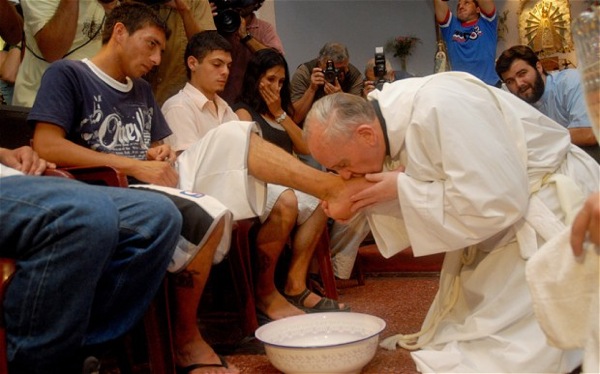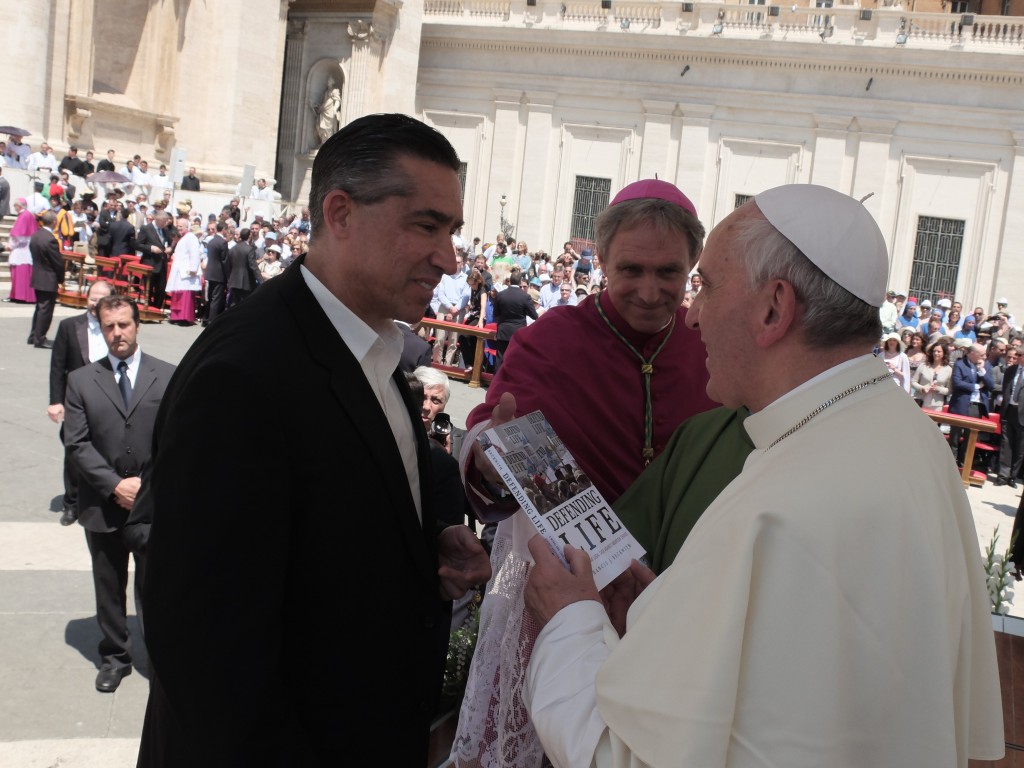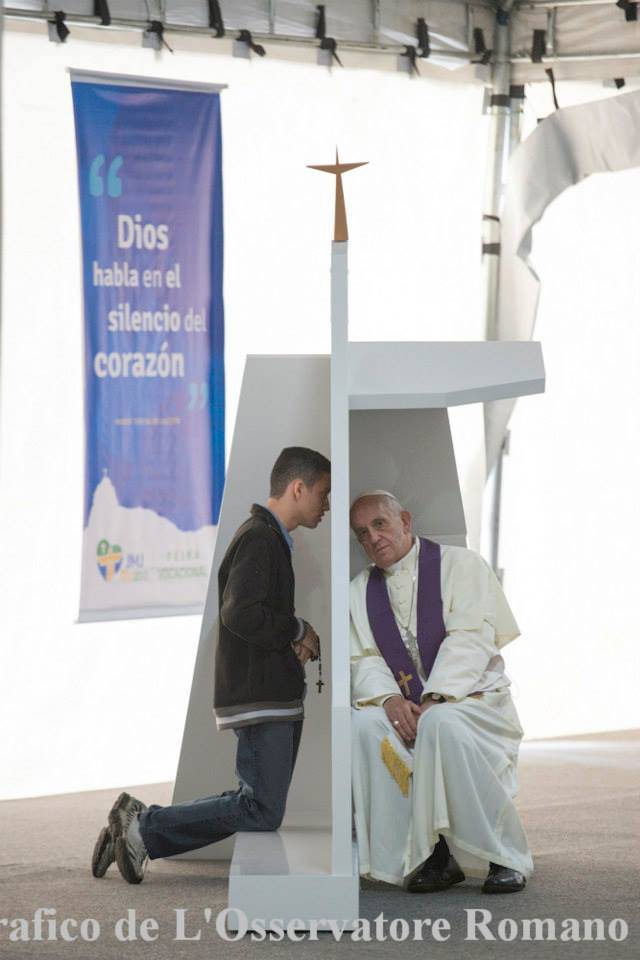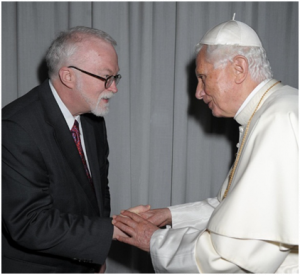You can read it here. I had heard of Tim Challies years ago. And I may have actually met or corresponded with him at some point in the past, but I do not recall. He seems like a nice guy, and I have no doubt that he is a devoted pastor, husband, and father.
In any event, I bring his blog post to your attention, since it serves as an excellent example of a talented writer misunderstanding the Catholic view on justification. Although there is more to Challies’ judgment of the Holy Father than his negative assessment of Catholic soteriology, my focus will be on that assessment. Writes Challies:
Roman Catholic doctrine states that justification is infused into a person through the sacrament of baptism. The Catholic Catechism explains: “Justification has been merited for us by the Passion of Christ. It is granted us through Baptism. It conforms us to the righteousness of God, who justifies us.” However, this justification is not a judicial declaration by God, but the beginning of a lifelong process of conformity. It is insufficient to save a person without the addition of good works. This infusion of righteousness enables a person to do the good works that complete justification. However, this justification can be diminished or even lost through sinful acts and in such cases it must be renewed and regained through confession, through the Eucharist, and through good works. Those who have been granted justification eventually merit heaven on the basis of the good works enabled by that justification. Again, according to the Catechism, “We can therefore hope in the glory of heaven promised by God to those who love him and do his will. In every circumstance, each one of us should hope, with the grace of God, to persevere ‘to the end’ and to obtain the joy of heaven, as God’s eternal reward for the good works accomplished with the grace of Christ.” This is another gospel, a false gospel, that adds human merit as a necessary addition to the work of Christ.
Not only does Challies get the Catholic view of justification wrong, he fails to note that the way that the Church presents its understanding of justification is in continuity with the work of St. Augustine, The Canons of the Council of Orange, St. Thomas Aquinas, and the Council of Trent. I document this in an article I published last summer, “Doting Thomists: Evangelicals, Thomas Aquinas, and Justification,” The Evangelical Quarterly 85.3 (July 2013): 211-227. Here’s an excerpt (notes omitted):
The Council [of Orange, AD 529], with papal sanction, rejected Pelagianism and semi-Pelagianism as heretical doctrines. The first, having its origin in the Catholic monk Pelagius (ca. 354–ca. 420/440), affirms that human beings do not inherit Adam’s sin (and thus denies the doctrine of original sin) and by their free will may achieve salvation without God’s grace. On the other hand, semi-Pelagianism maintains that a human being, though weakened by original sin, may make the initial act of will toward achieving salvation prior to receiving the necessary assistance of God’s grace. The Council of Orange, in contrast, argued that Adam’s original sin is inherited by his progeny and can only be removed by the sacrament of Baptism. By the means of Baptism God’s unmerited grace is infused for the remission of sins. According to the Council, justification is not the consequence of our initiative and then God assisting us by extending to us his mercy. Rather, ‘God himself’, writes the Council, ‘first inspires in us both faith in him and love for him without any previous good works of our own that deserve reward, so that we may both faithfully seek the sacrament of Baptism, and after Baptism be able by his help to do what is pleasing to him.’ Thus, the Christian’s inner transformation continues throughout his lifetime, entirely the work of the infusion of grace with which the Christian cooperates, for the Christian ‘does nothing good for which God is not responsible, so as to let him do it’.
It is not surprising, then, that one finds in Aquinas an account of grace and justification that embodies what his predecessors, including Augustine and the Council of Orange, embraced. Like the Council, Aquinas rejected Pelagianism and semi-Pelagianism and affirmed baptismal regeneration: “According to the CatholicFaith we are bound to hold that the first sin of the first man is transmitted to his descendants, by way of origin. For this reason children are taken to be baptized soon after their birth, to show that they have to be washed from some uncleanness. The contrary is part of the Pelagian heresy, as is clear from Augustine in many of his books…. As the Apostle says (Romans 5:15-16), the sin of Adam was not so far-reaching as the gift of Christ, which is bestowed in Baptism: ‘for judgment was by one unto condemnation; but grace is of many offenses, unto justification’. Wherefore Augustine says in his book on Infant Baptism (De Pecc. Merit. et Remiss. i), that “in carnal generation, original sin alone is contracted; but when we are born again of the Spirit, not only original sin but also wilful sin is forgiven”.’ [Aquinas, Summa Theologica II.I, Q81, art1, III, Q69, art1]
Like the Council of Orange (along with Augustine), Aquinas maintains that regeneration is wholly gratuitous… But Aquinas does so in line with his predecessors’ understanding of the role of sanctifying grace in both conversion and the Christian life. This means that infused grace is not only required for the Christian’s entry into the family of God at Baptism but also for her subsequent movement toward being conformed to the image of Christ. Consider, for example, Aquinas’s explanation of sanctifying grace as ‘habitual grace’. It has, he writes, ‘a double effect of grace, even as of every other form; the first of which is ‘being’, and the second, ‘operation’. For example, ‘the work of heat is to make its subject hot, and to give heat outwardly. And thus habitual grace, inasmuch as it heals and justifies the soul, or makes it pleasing to God, is called operating grace; but inasmuch as it is the principle of meritorious works, which spring from the free-will, it is called cooperating grace.’ Because God is the sole mover in the infusion of habitual grace, it is entirely attributable to Him. This is called operating grace. But if habitual grace is supposed to heal and justify the soul, and the soul has by nature certain powers to think and act, then this healing and justification must manifest itself in the activities of the soul. Thus, these acts allow us to cooperate with God for our inward transformation. This Aquinas calls cooperating grace, since any meritorious acts performed by a soul infused with habitual grace by God would lack merit without that grace and thus without God’s cooperation. He writes: ‘God does not justify us without ourselves, because whilst we are being justified we consent to God’s justification [justitiae] by a movement of our free-will. Nevertheless this movement is not the cause of grace, but the effect; hence the whole operation pertains to grace.’
For Aquinas, justification refers not only to the Christian’s initial entrance into the family of God at Baptism – which is administered for the remission of sins – but to the intrinsic work of both the infusion of that grace at Baptism and all the subsequent graces that work in concert to transform the Christian from the inside out. This is possible only because the baptized Christian literally partakes in the Divine Nature as a consequence of being infused with sanctifying grace. Consequently, for Aquinas, justification and sanctification are not different events, one extrinsic and the other intrinsic, as the Protestant Reformers taught. Rather, ‘sanctification’ is the ongoing intrinsic work of justifying, or making rightly-ordered, the Christian by means of God’s grace, the same grace that intrinsically changed the believer at the moment of her initial ‘justification’ (i.e., at Baptism) into an adopted child of the Father. Writes Aquinas, ‘Augustine says (De Gratia et Lib. Arbit. xvii): ‘God by cooperating with us, perfects what He began by operating in us, since He who perfects by cooperation with such as are willing, beings by operating that they may will’. But the operations of God ‘whereby He moves us to good pertain to grace. Therefore grace is fittingly divided into operating and cooperating’. For Aquinas, justification is as much about getting heaven into us as it is about getting us into heaven….
Although it is clear that Aquinas’s account of justification is in historical continuity with those of his predecessors, what about its continuity with his successors in the Catholic Church? According to the Proto-Protestant Thomists, the accounts of justification articulated by the Council of Trent and in the Catholic Church’s 1994 Catechism are not only inconsistent with the views of the Protestant Reformers – as one would expect – they are also inconsistent with Aquinas’s perspective. In fact, as I have already noted, [the late Reformed theologian John] Gerstner went so far as to say that Aquinas ‘taught the biblical doctrine of justification so that if the Roman Church had followed Aquinas the Reformation would not have been absolutely necessary’.
[R.C.] Sproul, for instance, claims that Trent’s account of justification ‘appeared, at least to the Reformers, to retreat to the semi-Pelagian position that, though the human will is weakened by the fall, it still has the spiritual power to incline itself toward grace’. In making his case for Tridentine semi-Pelagianism, Sproul quotes the following passage from chapter V of Trent’s sixth session: “It is furthermore declared that in adults the beginning of that justification must proceed from the predisposing grace of God through Jesus Christ, that is, from His vocation, whereby, without any merits on their part, they are called; that they who by sin had been cut off from God, may be disposed through His quickening and helping grace to convert themselves to their own justification by freely assenting to and cooperating with that grace; so that, while God touches the heart of man through the illumination of the Holy Ghost, man himself neither does absolutely nothing while receiving that inspiration, since he can also reject it, nor yet is he able by his own free will and without the grace of God to move himself to justice in His sight.”
Commenting on this passage, Sproul writes: ‘Here Rome makes it clear that fallen man cannot convert himself or even move himself to justice in God’s sight without the aid of grace. Again Pelagianism is repudiated.’ Thus, it seems that Sproul is saying that Trent, like Aquinas and Orange, maintained that regeneration precedes faith. Nevertheless, Sproul goes on to claim: ‘This predisposing grace, however, is rejectable. It is not in itself effectual. Its effectiveness depends on the fallen person’s assent and cooperation. This sounds very much like semi-Pelagianism, which had been condemned at Orange’.
As for the Catechism, Sproul offers this passage from it as evidence of its semi-Pelagianism: ‘God’s free initiative demands man’s free response, for God has created man in his image by conferring on him, along with freedom, the power to know him and love him.’ Commenting on this passage, Sproul writes that ‘to avoid the Reformation and Augustinian view of the enslaved will, Rome speaks of the power of fallen man to assent to and cooperate with prevenient grace. That grace is not effectual without the sinner’s response.’
Although what Sproul is affirming may be good Reformed theology, his reliance on Trent and the Catechism to make his case undermines his Proto-Protestant Thomism. First, the Council of Orange, whose canons Sproul embraces as orthodox and biblical, treats God’s grace in a fashion almost identical to the way Trent understands it: ‘According to the catholic faith we also believe that after grace has been received through Baptism, all baptized persons have the ability and responsibility, if they desire to labor faithfully, to perform with the aid and cooperation of Christ what is of essential importance in regard to the salvation of their soul’. (emphasis added) This is because, according to Orange, ‘[t]he freedom of will that was destroyed in the first man can be restored only by the grace of Baptism’, which, like Trent and the Catechism, presents Baptism as the instrumental cause of justification. So, if a free Adam can reject God, and our liberty has been restored to be like Adam’s, then it makes sense for Orange to declare that the salvation of our souls is conditioned upon our ‘desire to labor faithfully, to perform with the aid and cooperation of Christ what is of essential importance in regard to the salvation of their soul’. And yet, the council proclaims, ‘for as often as we do good, God is at work in us and with us, in order that we may do so’. And like Trent, Orange employs the language of infusion to describe how grace works in Baptism and the subsequent life of the believer including his cooperation.
Both Orange and Trent employ Jesus’s vine and branches account of His relationship to His Church (John 15:1-17) in order to explain the relationship between operating and cooperating grace and the role of faith and works in a believer’s salvation. The Council of Orange writes: ‘Concerning the branches of the vine. The branches on the vine do not give life to the vine, but receive life from it; thus the vine is related to its branches in such a way that it supplies them with what they need to live, and does not take this from them. Thus it is to the advantage of the disciples, not Christ, both to have Christ abiding in them and to abide in Christ. For if the vine is cut down another can shoot up from the live root; but one who is cut off from the vine cannot live without the root (John 15:5ff)’. And given that grace, we ‘have the ability and responsibility, if [we] desire to labor faithfully, to perform with the aid and cooperation of Christ what is of essential importance in regard to the salvation of [our] soul’. Over a millennium after Orange, the Church affirmed at Trent: “For since Christ Jesus Himself, as the head into the members and the vine into the branches, continually infuses strength into those justified, which strength always precedes, accompanies and follows their good works, and without which they could not in any manner be pleasing and meritorious before God, we must believe that nothing further is wanting to those justified to prevent them from being considered to have, by those very works which have been done in God, fully satisfied the divine law according to the state of this life and to have truly merited eternal life, to be obtained in its [due] time, provided they depart [this life] in grace….”
Not surprisingly, the Catechism offers an understanding of justification that is consistent with both Orange and Trent. Like the two councils, the Catechism affirms the absolute gratuitousness of God’s movement of the human will: ‘The first work of the grace of the Holy Spirit is conversion, effecting justification in accordance with Jesus’s proclamation at the beginning of the Gospel: “Repent, for the kingdom of heaven is at hand”[Matthew 4:17]. Moved by grace, man turns toward God and away from sin, thus accepting forgiveness and righteousness from on high’. And like Orange and Trent, the Catechism uses the language of cooperating grace in its account of human merit and the role it plays in justification: ‘The merit of man before God in the Christian life arises from the fact that God has freely chosen to associate man with the work of his grace. The fatherly action of God is first on his own initiative, and then follows man’s free acting through his collaboration, so that the merit of good works is to be attributed in the first place to the grace of God, then to the faithful. Man’s merit, moreover, itself is due to God, for his good actions proceed in Christ, from the predispositions and assistance given by the Holy Spirit’. Oddly, [Norman L.] Geisler quotes a sliver of this passage – ‘the merit of good works is attributed in the first place to the grace of God, then to the faithful’ (his emphasis) – and then concludes, ‘Hence, it is grace plus good works’, even though in context that is not what the Catechism is saying.
It seems to me that Geisler’s blind spot, one he shares with Gerstner and Sproul, is the consequence of abandoning the idea of participation in the Divine Nature, a view more explicitly taught in the Eastern Churches, though certainly essential to the West’s idea of justification as well. According to the Catholic view, sanctifying grace allows us to participate in the divine life. Thus, when we act in charity, we do not contribute to our justification, as if it were merely a case of God adding up our deeds on a cosmic balance sheet. This is why the Catechism teaches, ‘The merits of our good works are gifts of the divine goodness’. (Does that sound like ‘grace plus good works’?) Consequently, one’s cooperation does not take away from the fact that justification is a work of God, just as Christ’s human nature does not take away from the fact he is also fully God, and just as the Bible being authored by human beings does not diminish its stature as entirely God’s Word.
Second, because neither Trent nor the Catechism departs from Orange, and because Aquinas’s account of justification is in line with Orange as well (as I noted earlier in this article), it should not surprise us to learn that Trent, the Catechism, and Aquinas are in agreement on the doctrine of justification.
As we have seen, Aquinas held that one’s entry into the Body of Christ is the consequence of operating grace, wholly the work of God, and Trent and the Catechism maintain that position as well. The effect of grace, according to Aquinas, is to heal and justify the will so that the human being may freely partake in the Divine Nature and undergo transformation. Thus, any meritorious acts in which a soul infused with God’s grace freely engages could not be meritorious without that grace and thus without God’s cooperation (hence Aquinas calls it ‘cooperating grace’). For this reason, as I have already noted above, Aquinas writes that ‘God does not justify us without ourselves, because whilst we are being justified we consent to God’s justification [justitiae] by a movement of our free-will. Nevertheless this movement is not the cause of grace, but the effect; hence the whole operation pertains to grace’. Hence, Sproul’s claim that such grace is ‘not effectual without the sinner’s response’ begs the question, since its intended effect is to heal and justify the soul of a particular sort of being, one that is a moral agent with the intrinsic power to respond or not to respond. In that sense, the grace is most certainly effectual. Unsurprisingly, Augustine concurs with the Catechism and Aquinas, but according to Sproul the purpose of the Catechism’s account of grace was ‘to avoid the… Augustinian view of the enslaved will’. So, apparently, either it did not succeed or Augustine is not Augustinian.
Thus, it should come as no surprise that Aquinas (following Augustine), Trent and the Catechism are in continuity in their understanding of the relationship between justification, sanctifying grace, and the infusion of faith, hope, and charity. The Catechism declares: ‘Justification is at the same time the acceptance of God’s righteousness through faith in Jesus Christ. Righteousness (or ‘justice’) here means the rectitude of divine love. With justification, faith, hope, and charity are poured into our hearts, and obedience to the divine will is granted us’. Consistent with this, Trent affirms: ‘[M]an through Jesus Christ, in whom he is ingrafted, receives in that justification, together with the remission of sins, all these infused at the same time, namely, faith, hope and charity. For faith, unless hope and charity be added to it, neither unites man perfectly with Christ nor makes him a living member of His body’. And for Aquinas, ‘charity denotes union with God, whereas faith and hope do not’, and ‘grace is neither faith nor hope, for these can be without sanctifying grace’. Aquinas writes in his Commentary on Romans: ‘[T]he act of faith, which is to believe, depends on the intellect and on the will moving the intellect to assent. Hence, the act of faith will be perfect, if the will is perfected by the habit of charity and the intellect by the habit of faith, but not if the habit of charity is lacking’.The indwelling of Christ ‘is not perfect, unless faith is formed by charity, which by the bond of perfection unites us to God, as Col 3(:14) says’.
I want to conclude by making an observation about a passage in Challies’ post that struck me as one the most peculiar claims I have read in quite some time. He writes: “Even while Francis washes the feet of prisoners and kisses the faces of the deformed, he does so out of and toward this false gospel that leads not toward Christ, but directly away from him.” Apparently, according to Challies, following Jesus by obeying his commandments is no way to lead people to our Lord. But that’s not what I read in the gospels:
Then shall the king say to them that shall be on his right hand: Come, ye blessed of my Father, possess you the kingdom prepared for you from the foundation of the world. For I was hungry, and you gave me to eat; I was thirsty, and you gave me to drink; I was a stranger, and you took me in: Naked, and you covered me: sick, and you visited me: I was in prison, and you came to me. Then shall the just answer him, saying: Lord, when did we see thee hungry, and fed thee; thirsty, and gave thee drink? And when did we see thee a stranger, and took thee in? or naked, and covered thee? Or when did we see thee sick or in prison, and came to thee? And the king answering, shall say to them: Amen I say to you, as long as you did it to one of these my least brethren, you did it to me. (Mt. 25:34-40)
















